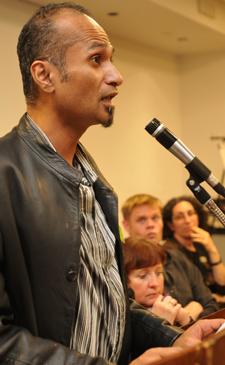Disclosing your HIV-positive status can mean exposing yourself to discrimination and legal risk, a forum on HIV disclosure and criminalization was told Nov 27.
“The positive person is always at risk,” said Maureen, an HIV-positive woman who didn’t use her last name. “Men will have sex knowing the woman is HIV-positive then blame her if they get infected. If anything happens I am guilty. There’s no one else in the bed to prove I made him wear a condom.”
Maureen was part of a panel discussion organized by the Ontario Working Group in Criminal Law and HIV Non-Disclosure, a coalition of AIDS service organizations from across the province.
The risk, and the stigma around HIV, can make it hard to disclose one’s status, Maureen told the audience, especially in a small community where word can get around.
“I go to the dentist,” she said. “I might tell him because of the interaction of drugs, but I might not because I’ve been stigmatized by doctors in the past. If we get rid of stigma I will disclose.
“If I think you’re going to talk to everybody about my HIV status I’m not going to disclose.”
Criminal liability and privacy are major concerns for those who are HIV-positive, said Ryan Peck, the executive director of the HIV and AIDS Legal Clinic (Ontario).
“Disclosure is potential disclosure to a whole community,” he said. “There’s very little you can do if a friend or a family member discloses your status. There’s also a real fear that a spurned ex will turn around and lie to the police.”
Panel members also expressed worry about the power public health agencies wield in Ontario. Rita Shahin, an associate medical officer of health with Toronto Public Health, said the agency sometimes has no choice but to take drastic action against HIV-positive people, even if they’re taking precautions.
“Using a condom is not enough,” she said. “We believe you must disclose your status to have truly informed consent. We have a responsibility to ensure that partners are notified. We strive to maintain confidentiality but sometimes we have to breach it. The Public Health Act gives us the ability to collect information on people who have a sexually transmitted disease or issue what’s called a Section 22 order [under which] the infected person can be ordered to take precautions, to use a condom, to notify their partner.”
Shahin said her agency can also issue a Section 102 order, under which a justice of the peace can declare someone in contempt of court for breaching a Section 22 order. But Shahin said Toronto Health will not report someone to the police, at least not directly.
“We in Toronto will not report people to the police,” she said, “but we tell people who’ve been infected that they have the option of going to the police.”
The police approach is a major part of the problem, said Matt Mills, the associate publisher and managing editor of Xtra. Mills told the audience of a case he wrote about while working for Xtra West, Xtra’s Vancouver sibling. The case involved an HIV-positive man who was eventually charged for allegedly having unprotected sex.
“In February of 2006 a flyer appeared around Vancouver that was disseminated by the Vancouver police department,” said Mills. “At the top it said, ‘Wanted: Sex Offender.’ It was appalling behaviour on the part of the Vancouver police. He wasn’t wanted, they knew where he was. He was cooperating and he wasn’t a sex offender by any stretch of the imagination. His case drags on to this day.”
Derek Yee, who is HIV-positive, said he encounters similar attitudes regularly.
“I’m branded as a criminal,” he said. “Now they tell me my body is a weapon. HIV does not change a person. It is the attitude of those around who change a person.”
Yee said he understands being angry, but says people have to get beyond that.
“Pressing criminal charges comes from anger,” he said. “If I had a time machine and could go back 20 years and have a conversation with the man who infected me, I would forgive him.”
A woman from the audience who had been infected through unprotected sex echoed Yee’s feelings.
“One of the things I found so empowering was when I realized my part in it,” she said. “I had sex with him and it was incredibly fun. I wasn’t part of a criminal trial but five years later his face was all over [the media]. I attended his trial and I kept thinking, ‘How come the responsibility wasn’t with someone else?'”
“I was in awe that he was able to persuade so many women to have sex without condoms.”


 Why you can trust Xtra
Why you can trust Xtra


